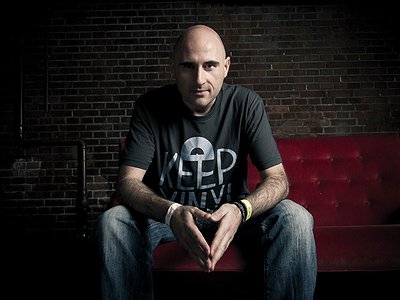When did you start writing/producing music - and what or who were your early passions and influences?
I started making my own music seriously when I was around 14, trying out samples on a Casio home keyboard. Early influences were Jean-Michel Jarre and The Police.
What do you personally consider to be the incisive moments in your artistic work and/or career?
Most certainly the ones that haven't arrived yet. But of the body of work I've released so far, I would say Mystical Rhythm, My Desire, Every Soul Needs A Guide and Serene are the most accomplished personally.
What are currently your main compositional- and production-challenges?
I'm in the process of trying lots of new ideas and finishing tracks that have been burning for a while. One of my main challenges is time, due to the different types of music I'm making, and giving myself enough time between the styles to wind down and get into the next groove.
What do you usually start with when working on a new piece?
Usually, it's the melodies and the chords. I've got folders full of tracks that are just music ready for the right moment when I have the rhythm and bass ready for it.
How strictly do you separate improvising and composing?
There is no separation, it's all a natural process and the ideas don't stop just because you need to do some EQing. Even during mixdowns I end up thinking of something new and putting it in. Sometimes I end up never being finished with tracks, but for the most part I would much rather wait to get it the way I want it than putting it out unfinished or ‘good enough’ - that's not my ideology.
How do you see the relationship between sound, space and composition?
In electronic terms, structure is vital for a dancefloor and it has to have the right energy to carry it through. The space is the least important, but for very musical pieces like ambient or classical music, all three cogs of that wheel are inseparable and indispensable. They are all as one and are essential to be thought of at the same time from start to finish, otherwise ultimately the end result will fail.
Do you feel it important that an audience is able to deduct the processes and ideas behind a work purely on the basis of the music? If so, how do you make them transparent?
Again, if were talking about spaced-out clubbers, the answer is no. They just want to enjoy the music, not how it's developed. This is something I've learned over the last three years - by playing keyboard solos to crowds that just want to go nuts to a bass drum! But, there will always be educated music fans out there who understand the processes and the hard work that's gone into what people hear. Making the processes clear to an audience is a fine balance between not taking anything away from the music and actually feeding them enough visual information to educate.
In how much, do you feel, are creative decisions shaped by cultural differences – and in how much, vice versa, is the perception of sound influenced by cultural differences?
Great question. Most artists listen and see what's going on around them. It's hard not to take influence from this. Sure, there are artists out there who are going to do what they are doing no matter what and use other ways to generate publicity or success. But for the most part, artists need to listen to the people who are standing watching and listening. If they get ignored, it's not long until the artist sees interest disappear, so it's all about finding the balance between what people want to hear, and giving them what they want to hear BEFORE they’ve heard it.
The relationship between music and other forms of art – painting, video art and cinema most importantly - has become increasingly important. How do you see this relationship yourself and in how far, do you feel, does music relate to other senses than hearing alone?
Technology gives us greater access to easily made combinations of the arts, and our love for all art will always tempt us to mix and match them, this is the natural order of it. As stand alone arts, they have no function other than themselves, so combining them can make such a powerful emotive experience, however done badly, the results can be simply horrific. One of the reasons I regard audio as one of the most powerful senses is that it's not just about the frequencies of the sound. Colours and shapes are huge in music, as well as vibrations. Synaesthesia is more common among musicians than we realise - and that's because it just feels so natural.



